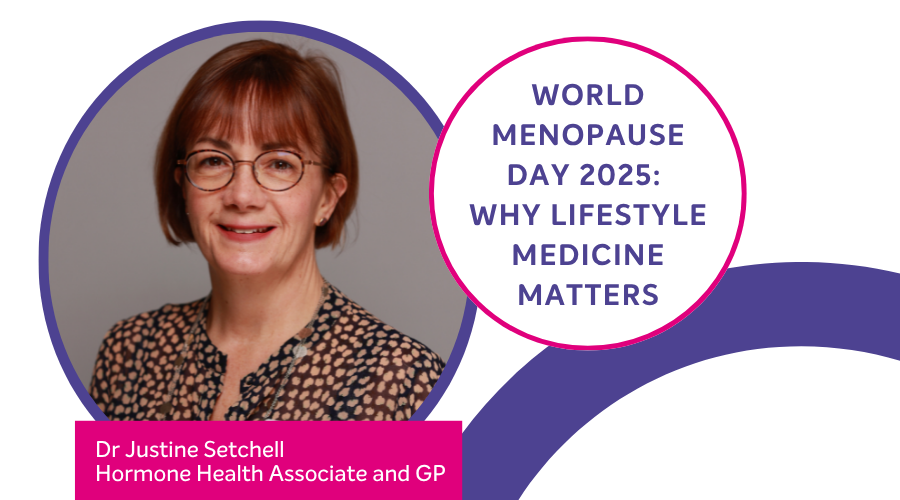World Menopause Day 2025: Why Lifestyle Medicine Matters

Annually, on 18 October the world comes together to raise awareness of menopause and to support women through this natural life transition.
This year’s chosen theme is Lifestyle Medicine; emphasising how daily habits play a crucial role in navigating menopause and maintaining long-term health.
At Hormone Health, we are proud to contribute to this conversation. Our team of experts recognise that lifestyle choices can significantly impact how women experience menopause; not only in managing symptoms, but in promoting long-term physical and emotional wellbeing.
What is Lifestyle Medicine and Why it Matters in Menopause
Lifestyle medicine focuses on evidence-based strategies that help prevent, manage, and even reverse chronic health conditions through changes in daily habits. For women going through menopause, this approach can help reduce symptoms, improve energy levels, and support long-term health. It spans areas such as:
- Nutrition and dietary patterns
- Physical activity and movement
- Sleep and restoration
- Stress management and mental wellbeing
- Relationships, community, and social support
- Reduction of harmful exposures
In the context of menopause, these pillars help in several ways:
- Supporting metabolic health and reducing risks of weight gain, insulin resistance, and cardiovascular disease
- Improving mood, cognition, and stress resilience
- Enhancing sleep quality and recovery
- Reducing inflammation, which may worsen symptoms
How Lifestyle Choices Can Support Menopause
While no two menopause journeys are exactly alike, many women experience symptoms such as hot flushes, sleep disturbances, mood changes, and weight gain. Lifestyle medicine can help manage these changes in practical, sustainable ways.
1. Nourish Your Body
Eating a diet rich in whole foods – including vegetables, lean proteins, healthy fats, and fibre – helps regulate blood sugar, support digestion, and maintain a healthy weight. Nutrients like calcium, magnesium and vitamin D are also key for bone health.
2. Move Regularly and Lift Weights
Physical activity supports cardiovascular health, strengthens bones, and boosts mood. Weightlifting including bodyweight exercises such as squats and press ups improves bone and muscle strength; keeping us strong as we age whilst aiding weight management.
3. Prioritise Sleep
Sleep challenges are common during menopause. Creating a calm bedtime routine, limiting screen time before bed, and maintaining a consistent sleep schedule can help improve sleep quality and overall wellbeing.
4. Manage Stress
Chronic stress can intensify menopause symptoms. Mindfulness, meditation, breathing exercises, and staying socially connected are effective ways to build emotional resilience and restore balance.
5. Build a Support Network
Strong relationships and emotional support can have a powerful impact on health. Whether it is talking with friends, joining a support group, or working with a healthcare professional, connection matters.
6. Cut Back on Harmful Habits
Reducing alcohol, quitting smoking, and avoiding ultra-processed foods can help support hormone regulation and reduce the risk of long-term health issues.
Integrating Lifestyle with Hormonal Care
At Hormone Health, we take an integrated approach to menopause care. For many women, combining personalised hormone therapy with positive lifestyle changes leads to the best outcomes. By addressing both the biological and behavioural aspects of health, we empower women to take control of their menopause journey.
Ready to Take the Next Step in Your Menopause Journey?
If you are looking for expert, personalised support through menopause, Dr Justine Setchell is here to help. With more than 21 years of experience as a GP, and a member of the British Menopause Society, Dr Setchell takes a compassionate, evidence-based approach to care. Dr Setchell has promoted lifestyle medicine throughout her career, firmly believing in prevention as well as cure, and works closely with each patient to develop a personalised treatment plan tailored to their individual needs.
Book a consultation today with Dr Setchell to discuss your symptoms, ask questions, and explore the options that are right for you.
Get in touch. We can help.
The Hormone Health Associates are here to advise and support.
Call: +44 (0)808 196 1901
Email: info@hormonehealth.co.uk